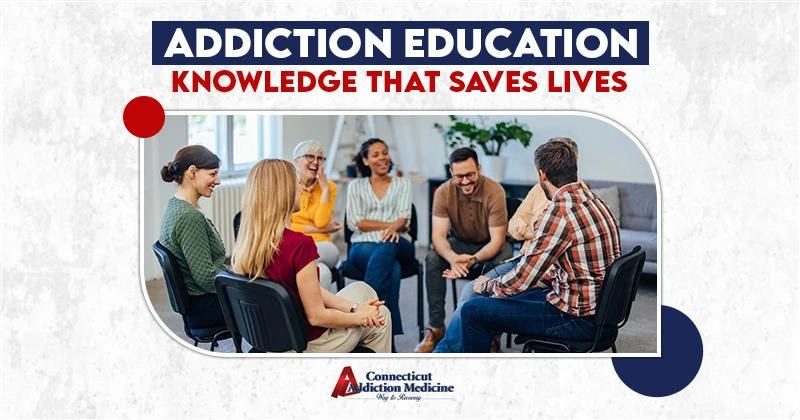Have you ever thought about why so many people become addicted and so few can get freed?
The reason is often a simple lack of awareness and addiction education.
Addiction education provides people, families, and communities with the understanding of the early warning signs so that steps can be taken to prevent more serious substance problems.
Education also teaches people that addiction is not a moral failing; addiction is a chronic illness that can be treated and managed with appropriate supports and treatment.
At CT Addiction Medicine, we believe knowledge is the first step in healing. Our team serves patients by providing evidence-based education, care, and evidence-based treatment plans to help patients build their lives.
Why Addiction Education Matters
Addiction education is a strong weapon to counter misinformation and stigma. Many people still view addiction as a weakness of willpower or character. But addiction is caused by a complex interaction of factors, such as genetics, psychology, and environment.
Education helps individuals learn that addiction actually modifies brain chemistry which changes behavior and decision-making. Also, education helps to normalize the fact that recovery is possible through consistent effort, therapy, and/or medical care.
Key reasons addiction education matters:
- Promotes awareness about early warning signs and triggers
- Reduces stigma around seeking help
- Encourages supportive community environments
- Improves treatment outcomes
- Prevents relapse by teaching coping strategies
Understanding Addiction
Addiction impacts millions of individuals around the globe, regardless of age, gender or social standing. In the age of the internet and everything being readily available to everybody, you can easily get what you want, even from prescription opioids, alcohol, and now behavioral addictions like gaming or gambling.
Without the educational components that come with addiction, often people are unaware of the subtle signs. Something like occasional misuse quickly turns into dependence, and with dependence comes addiction. By the time you figure out something is going on, you are many layers into it.
The Power of Education About Addiction
By educating communities, we can create a culture of prevention rather than reaction. Knowledge becomes a shield against addiction’s destructive patterns.
Effective education about addiction includes:
- Knowing the science of addiction
- Understanding the signs of substance use disorder
- Knowing how to seek help professionally
- Developing emotional resiliency and coping skills
To best educate our communities, we are establishing a culture of prevention rather than response. Knowledge can also become a shield against the destructive patterns of addiction.
Opioid Addiction Education: Saving Lives Every Day
Many with comprehensive opioid addiction experience first had a valid prescription. The education surrounding opioid addiction focuses on the risks of misuse and the importance of being compliant with medical advice.
The Benefits of Opioid Education:
- Promotes awareness of the dangers of overdose
- Encourages the safe storage or disposal of opioids
- Stresses the importance of non-opioid management of pain
- Teaches how to administer naloxone in case of overdose.
Addiction Education Programs: Spreading Awareness
Here’s a quick comparison of common program types:
| School-based Programs | Teens, Students | Prevention, coping skills, peer pressure | Workshops, Talks |
| Community Awareness Sessions | General Public | Early signs, stigma reduction | Seminars, Campaigns |
| Professional Training Programs | Healthcare Providers | Treatment protocols, patient education | Certification |
| Family Support Programs | Families of Addicts | Coping, communication, boundaries | Group sessions |
Benefits of Addiction Recovery Education:
· Helps the individual recognize relapse triggers
· Builds self-efficacy and accountability
· Promotes goal-setting and building healthy routines
· Builds community through shared learning
Addiction Treatment Education Supports Long-Term Success
In addiction treatment education, patients learn what they will experience during detox, therapy, and aftercare.
When addiction treatment education is provided, people take ownership of their recovery. Knowing what they going to experience reduces fear and anxiety, reducing barriers to effective treatment.
Final Words
Addiction education is not just knowledge-transfer; it’s a transformation process. It interrupts the cycle of stigma and ignorance, and creates a cycle of understanding and hope.
Education about addiction is beneficial not just for individuals but is often a family and community benefit. When people understand addiction, they view it through compassion versus judgment.
Opioid addiction education will continue to save lives simply by raising awareness about prescription misuse and prevent overdoses. Addiction recovery education and influencing addiction treatment education show the map to lifelong recovery.
At CT Addiction Medicine, addiction education is central to our healing philosophy. We want every patient to understand their diagnosis and treatment plan.
All of our programs are designed to combine everyday addiction education, therapy, and individualized medical treatment.
FAQs
Q:What does opioid addiction education cover?
Opioid addiction education involves medication safety, overdose prevention and education, as well treatment education.
Q:Can families benefit from addiction recovery educational programs?
Yes, it helps families understand the recovery journey and support the recovery process with dignity.

